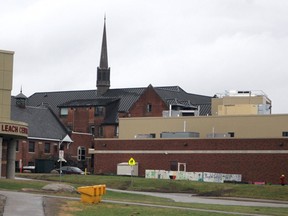Science
Algoma University Receives $541,000 in Federal Research Grants

Research conducted by three professors at Algoma University has secured significant backing through federal funding. The professors, Ping Luo and Syed Muhammad Danish, both assistant professors in the field of computer science and technology, alongside Isabel Molina, a Tier II Canada Research Chair, will share $541,000 over a span of five years from the Natural Sciences and Engineering Research Council of Canada (NSERC) Discovery Grants.
Ping Luo is focusing on developing advanced artificial intelligence tools aimed at enhancing the early detection of cancer, which could lead to more accurate diagnoses. Meanwhile, Syed Muhammad Danish is working on creating smarter and more environmentally friendly infrastructure for electric vehicles, as well as renewable energy systems. These projects are expected to contribute to significant advancements in their respective fields.
On another front, Isabel Molina is investigating how plants naturally produce protective compounds. This research holds the potential to revolutionize sustainable farming practices and technology, which could have far-reaching implications for agricultural efficiency and environmental preservation.
The funding is a testament to the university’s commitment to addressing pressing global challenges. Brett Goodwin, the interim vice-president for academic and research at Algoma University, expressed pride in the faculty’s leadership in critical areas such as computer science, life sciences, and environmental innovation. He emphasized the importance of these research initiatives in providing exceptional learning opportunities for students, particularly in the newly launched graduate programs in biology and computer science.
The support from NSERC underscores the vital role academic research plays in fostering innovation and addressing real-world issues. As these professors embark on their funded projects, the potential advancements in cancer detection, sustainable infrastructure, and agricultural technology could lead to significant benefits for society at large.
With this funding, Algoma University continues to strengthen its position as a hub for impactful research, driving forward important initiatives that align with national and global priorities.
-

 Science3 months ago
Science3 months agoToyoake City Proposes Daily Two-Hour Smartphone Use Limit
-

 Top Stories3 months ago
Top Stories3 months agoPedestrian Fatally Injured in Esquimalt Collision on August 14
-

 Health3 months ago
Health3 months agoB.C. Review Reveals Urgent Need for Rare-Disease Drug Reforms
-

 Technology3 months ago
Technology3 months agoDark Adventure Game “Bye Sweet Carole” Set for October Release
-

 World3 months ago
World3 months agoJimmy Lai’s Defense Challenges Charges Under National Security Law
-

 Lifestyle3 months ago
Lifestyle3 months agoVictoria’s Pop-Up Shop Shines Light on B.C.’s Wolf Cull
-

 Technology3 months ago
Technology3 months agoKonami Revives Iconic Metal Gear Solid Delta Ahead of Release
-

 Technology3 months ago
Technology3 months agoApple Expands Self-Service Repair Program to Canada
-

 Technology3 months ago
Technology3 months agoSnapmaker U1 Color 3D Printer Redefines Speed and Sustainability
-

 Technology3 months ago
Technology3 months agoAION Folding Knife: Redefining EDC Design with Premium Materials
-

 Business3 months ago
Business3 months agoGordon Murray Automotive Unveils S1 LM and Le Mans GTR at Monterey
-

 Technology3 months ago
Technology3 months agoSolve Today’s Wordle Challenge: Hints and Answer for August 19









